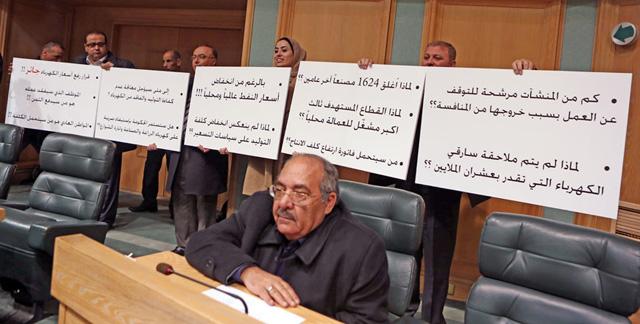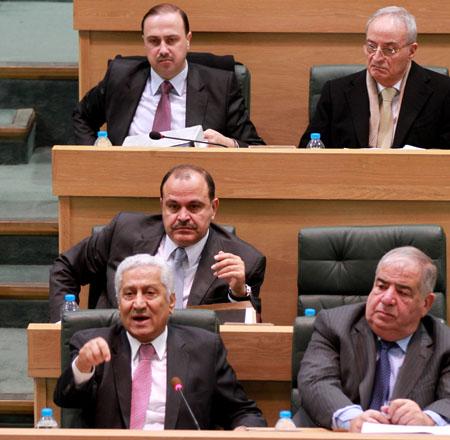You are here
Deputies urge gov’t to reverse electricity price hike
By Raed Omari - Jan 04,2015 - Last updated at Jan 04,2015

AMMAN — MPs on Sunday called on the government to go back on its decision to increase electricity prices, primarily citing the considerable decline in international oil prices.
The deputies’ pleas to the government were made during Sunday’s session which was decided by an overwhelming majority of MPs to be on the new electricity pricing mechanism after it was originally scheduled to deliberate a set of laws.
During the session, some MPs criticised the government’s decision to increase electricity prices, arguing that it has lost its validating reasons with the decline in international oil prices.
Others warned of the consequences from increasing electricity tariffs on the flow of investments to Jordan, urging the government to look for other alternatives to resolve the accumulated economic woes.
Many MPs said the hike will have a “deep” impact on the industrial sector, affecting more than 2,000 factories employing 20 per cent of the Kingdom’s labour force.
They also noted that several neighbouring countries have reduced electricity prices in light of the decrease in oil prices.
Some lawmakers went further, criticising the government’s economic policies in general and accusing it of taking decisions without consulting the Lower House and of “giving inaccurate and misleading figures” to pass its “arbitrary” decisions.
During the session, a group of 24 MPs signed a memorandum requesting a no-confidence motion against Prime Minister Abdullah Ensour’s government, citing their constitutional right to do so.
In the memo, a copy of which was obtained by The Jordan Times, the signatories said the government’s “arbitrary and unwise” decisions are behind citizens’ difficult economic circumstances, the budget deficit, poverty and unemployment.
Meanwhile, a few MPs called for restraint and reason, expressing confidence in the government’s ability to protect the country from more economic difficulties.
They said the government has succeeded in “saving” the national economy.
In recent remarks to The Jordan Times, Energy Minister Mohammad Hamed said electricity tariffs will increase by up to 15 per cent starting in January as part of a plan to gradually end subsidies and reduce the National Electric Power Company’s (NEPCO) losses, which reached JD1.2 billion at the end of 2014. He blamed the disruption of the relatively cheap Egyptian natural gas supplies for the losses, as this forced NEPCO to rely on more expensive heavy oil to generate electricity.
In 2013, the government increased prices of electricity for households and industries with monthly consumption of more than 600 and 10,000 kilowatt hours (kWh) respectively.
Electricity tariffs for households whose monthly consumption is 601kWh increased from JD0.141 to JD0.152 per kWh and will rise gradually until they reach JD0.188 by 2017.Under the new pricing mechanism, a 25 per cent discount for security bodies, civil societies and municipalities was cancelled as well as a 75 per cent discount for workers at electricity companies.
Related Articles
A joint parliamentary panel will examine the new electricity pricing mechanism with the government in hopes of reaching other solutions to the National Electric Power Company’s accumulated debts.
The Lower House on Sunday rejected a recommendation by a joint parliamentary committee to raise electricity tariffs by 7.5 per cent instead of 15 per cent under a deal it recently reached with the government.
Electricity tariffs will increase by up to 15 per cent starting in January as part of a plan to gradually end subsidies and reduce the National Electric Power Company’s (NEPCO) losses, the government said Wednesday.


















